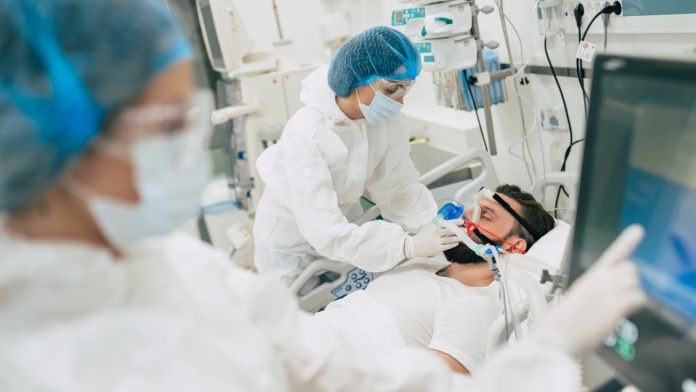
A new study has found that 14 proteins in the blood of critically ill patients are associated with recovering from Covid.
A single blood sample from a critically ill COVID-19 patient can be analysed by a machine learning model which uses blood plasma protein to predict Covid recovery likelihood, weeks before the outcome.
Healthcare systems globally continue to struggle to accommodate high numbers of severely ill COVID-19 patients who need special medical attention, especially if they are at high risk. Clinically established risk assessments in intensive care medicine, such as the SOFA or APACHE II, show limited reliability in predicting whether recovering from covid will be achieved.
The new study was published in the open-access journal PLOS Digital Health by Florian Kurth and Markus Ralser of the Charité – Universitätsmedizin Berlin, Germany, and colleagues.
Recovering from covid in intensive care
In the new study, researchers studied the two independent cohorts of patients with severe COVID-19 who required intensive care and invasive mechanical ventilation to understand whether they were able to predict patients recovering from Covid. The team analysed the levels of 321 proteins in blood samples taken at 349-time points from 50 critically ill COVID-19 patients being treated in two independent health care centres in Germany and Austria. A machine learning approach was used to find associations between the measured proteins and patients’ likelihood of recovery.
15 of the patients in the cohort died; the average time from admission to death was 28 days. For the patients recovering from covid, they spent a median time of 63 days being hospitalised. The researchers pinpointed 14 proteins that, over time, changed in opposite directions for patients recovering from Covid compared to patients that did not in intensive care.
Machine learning model
The team then developed a machine learning model to predict recovery based on a single time-point measurement of relevant proteins and tested the model on an independent validation cohort of 24 critically ill COVID-19 patients. The model demonstrated high predictive power on this cohort, correctly predicting the outcome for 18 of the 19 patients who ended up recovering from Covid and five out of five patients who died (AUROC = 1.0, P = 0.000047).
The team studied the plasma proteome in the two characterised cohorts, which holds the promise of integrating the genetic background of an individual with their life history, physiological, nutritional, and demographic parameters. They hypothesised that it reflected the complete set of proteins that are expressed by an organism and are present in the blood, which is known to comprehensively capture the host response to COVID-19, can be leveraged to allow for prediction of survival in the most critically ill patients with COVID-19.
The researchers concluded that blood protein tests if validated in larger cohorts, may be useful in both identifying patients with the highest mortality risk, as well as for testing whether a given treatment changes the projected trajectory of an individual patient.
























